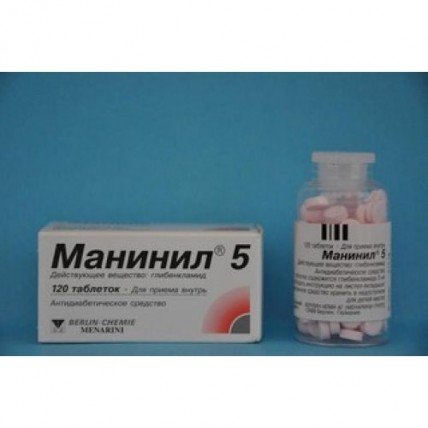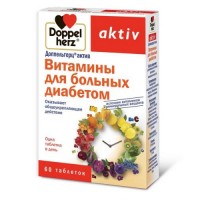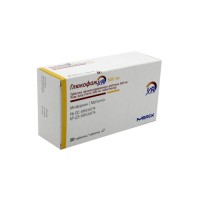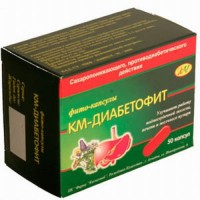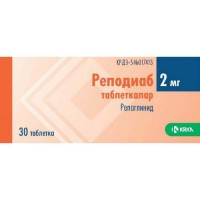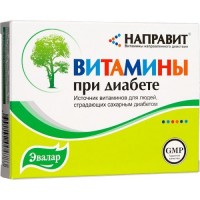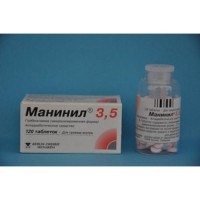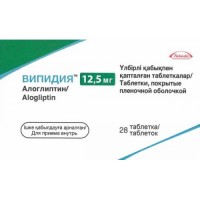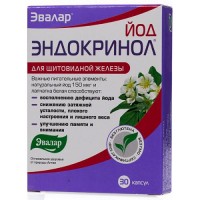Maninil (Glibenclamide/Glyburide) 5 mg (120 tablets)
- $11.00
Out Of Stock
Active ingredient: Glibenclamide (micronized form) - 5,000 mg. Excipients: lactose monohydrate, potato starch, gimetellose, colloidal silicon dioxide, magnesium stearate, crimson dye
Diabetes mellitus type 2 (with the ineffectiveness of diet therapy). Combination therapy with insulin for daytime glycemic control.
The dose depends on age, severity of diabetes, fasting blood glucose concentration and 2 hours after eating.
The average daily dose ranges from 2.5 to 15 mg. The frequency of admission is 1-3 times a day 20-30 minutes before meals. Doses over 15 mg / day do not increase the severity of the hypoglycemic effect.
The initial dose in elderly patients is 1 mg / day. When replacing hypoglycemic drugs with a similar type of action, glibenclamide is prescribed according to the scheme given above, and the previous drug is immediately canceled.
When switching from biguanides, the initial daily dose is 2.5 mg, if necessary, the daily dose is increased every 5-6 days by 2.5 mg until compensation is achieved.
In the absence of compensation within 4-6 weeks, it is necessary to decide on the conduct of combination therapy.
Hypersensitivity, type 1 diabetes mellitus (including in childhood and adolescence), diabetic ketoacidosis, diabetic precoma and coma, hyperosmolar coma, microangiopathy, hepatic and / or renal failure, extensive burns, trauma, major surgical interventions, intestinal obstruction , gastric paresis, conditions accompanied by impaired absorption of food and the development of hypoglycemia (infectious diseases), leukopenia, pregnancy, lactation. With caution. Feverish syndrome, alcoholism, adrenal insufficiency, thyroid disease (hypothyroidism or thyrotoxicosis).
Hypoglycemia (in case of violation of the dosage regimen and inadequate diet); weight gain, fever, arthralgia, proteinuria, allergic reactions (skin rash, itching), dyspepsia (nausea, diarrhea, feeling of heaviness in the epigastrium), neurological disorders (paresis, sensitivity disorders), hematopoiesis disorders (hypoplastic or hemolytic anemia, leukopenia, agranulocytosis, pancytopenia, eosinophilia, thrombocytopenia), liver dysfunction (cholestasis), tardive cutaneous porphyria, changes in taste, polyuria, photosensitivity, headache, increased fatigue, weakness, dizziness. Overdose. Symptoms: hypoglycemia (hunger, increased sweating, severe weakness, palpitations, tremors, anxiety, headache, dizziness, insomnia, irritability, depression, cerebral edema, speech and vision impairment, impaired consciousness), hypoglycemic coma.
Treatment: if the patient is conscious, take sugar by mouth, in case of loss of consciousness - inject dextrose intravenously (intravenous bolus - 50% dextrose solution, then infusion of 10% solution), 1-2 mg of glucagon s / c, i / m or intravenous, diazoxide 30 mg intravenously for 30 minutes, monitoring glucose concentration every 15 minutes, as well as determining pH, urea nitrogen, creatinine, electrolytes in the blood.
After the restoration of consciousness, it is necessary to give the patient food rich in easily digestible carbohydrates (in order to avoid the re-development of hypoglycemia). With cerebral edema - mannitol and dexamethasone.
It is necessary to regularly monitor fasting blood glucose and after meals, the daily curve of glucose in blood and urine. In the case of surgery or diabetes decompensation, it is necessary to consider the possibility of using insulin preparations. Patients should be warned about the increased risk of hypoglycemia in cases of taking ethanol (including the possible development of disulfiram-like reactions: abdominal pain, nausea, vomiting, headache), NSAIDs, and fasting.
During treatment, it is not recommended to stay in the sun for a long time. Dose correction is necessary in case of physical and emotional overstrain, changes in diet.
Clinical manifestations of hypoglycemia can be masked when taking beta-blockers, clonidine, reserpine, guanethidine.
During the period of treatment, care must be taken when driving vehicles and engaging in other potentially hazardous activities that require increased concentration of attention and speed of psychomotor reactions.
ACE inhibitors (captopril, enalapril), blockers of H2-histamine receptors (cimetidine), antifungal drugs (miconazole, fluconazole), NSAIDs (phenylbutazone, azapropazone, oxyphenbutazone), fibrates (clofibrates), antiphibiculic acid a number of anabolic steroids, beta-blockers, MAO inhibitors, long-acting sulfonamides, cyclophosphamides, biguanides, chloramphenicol, fenfluramine, acarbose, fluoxetine, guanetidine, pentoxifylline, tetracycline, theophylline, disyrapylinum blockers, canalpinalin allopurinol enhances the effect. Weaken the effect of barbiturates, GCS,
Indications
Diabetes mellitus type 2 (with the ineffectiveness of diet therapy). Combination therapy with insulin for daytime glycemic control.
Method of administration and dosage
The dose depends on age, severity of diabetes, fasting blood glucose concentration and 2 hours after eating.
The average daily dose ranges from 2.5 to 15 mg. The frequency of admission is 1-3 times a day 20-30 minutes before meals. Doses over 15 mg / day do not increase the severity of the hypoglycemic effect.
The initial dose in elderly patients is 1 mg / day. When replacing hypoglycemic drugs with a similar type of action, glibenclamide is prescribed according to the scheme given above, and the previous drug is immediately canceled.
When switching from biguanides, the initial daily dose is 2.5 mg, if necessary, the daily dose is increased every 5-6 days by 2.5 mg until compensation is achieved.
In the absence of compensation within 4-6 weeks, it is necessary to decide on the conduct of combination therapy.
Contraindications
Hypersensitivity, type 1 diabetes mellitus (including in childhood and adolescence), diabetic ketoacidosis, diabetic precoma and coma, hyperosmolar coma, microangiopathy, hepatic and / or renal failure, extensive burns, trauma, major surgical interventions, intestinal obstruction , gastric paresis, conditions accompanied by impaired absorption of food and the development of hypoglycemia (infectious diseases), leukopenia, pregnancy, lactation. With caution. Feverish syndrome, alcoholism, adrenal insufficiency, thyroid disease (hypothyroidism or thyrotoxicosis).
Side effects
Hypoglycemia (in case of violation of the dosage regimen and inadequate diet); weight gain, fever, arthralgia, proteinuria, allergic reactions (skin rash, itching), dyspepsia (nausea, diarrhea, feeling of heaviness in the epigastrium), neurological disorders (paresis, sensitivity disorders), hematopoiesis disorders (hypoplastic or hemolytic anemia, leukopenia, agranulocytosis, pancytopenia, eosinophilia, thrombocytopenia), liver dysfunction (cholestasis), tardive cutaneous porphyria, changes in taste, polyuria, photosensitivity, headache, increased fatigue, weakness, dizziness. Overdose. Symptoms: hypoglycemia (hunger, increased sweating, severe weakness, palpitations, tremors, anxiety, headache, dizziness, insomnia, irritability, depression, cerebral edema, speech and vision impairment, impaired consciousness), hypoglycemic coma.
Treatment: if the patient is conscious, take sugar by mouth, in case of loss of consciousness - inject dextrose intravenously (intravenous bolus - 50% dextrose solution, then infusion of 10% solution), 1-2 mg of glucagon s / c, i / m or intravenous, diazoxide 30 mg intravenously for 30 minutes, monitoring glucose concentration every 15 minutes, as well as determining pH, urea nitrogen, creatinine, electrolytes in the blood.
After the restoration of consciousness, it is necessary to give the patient food rich in easily digestible carbohydrates (in order to avoid the re-development of hypoglycemia). With cerebral edema - mannitol and dexamethasone.
Special instructions
It is necessary to regularly monitor fasting blood glucose and after meals, the daily curve of glucose in blood and urine. In the case of surgery or diabetes decompensation, it is necessary to consider the possibility of using insulin preparations. Patients should be warned about the increased risk of hypoglycemia in cases of taking ethanol (including the possible development of disulfiram-like reactions: abdominal pain, nausea, vomiting, headache), NSAIDs, and fasting.
During treatment, it is not recommended to stay in the sun for a long time. Dose correction is necessary in case of physical and emotional overstrain, changes in diet.
Clinical manifestations of hypoglycemia can be masked when taking beta-blockers, clonidine, reserpine, guanethidine.
During the period of treatment, care must be taken when driving vehicles and engaging in other potentially hazardous activities that require increased concentration of attention and speed of psychomotor reactions.
Interaction
ACE inhibitors (captopril, enalapril), blockers of H2-histamine receptors (cimetidine), antifungal drugs (miconazole, fluconazole), NSAIDs (phenylbutazone, azapropazone, oxyphenbutazone), fibrates (clofibrates), antiphibiculic acid a number of anabolic steroids, beta-blockers, MAO inhibitors, long-acting sulfonamides, cyclophosphamides, biguanides, chloramphenicol, fenfluramine, acarbose, fluoxetine, guanetidine, pentoxifylline, tetracycline, theophylline, disyrapylinum blockers, canalpinalin allopurinol enhances the effect. Weaken the effect of barbiturates, GCS,
